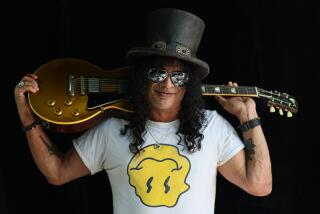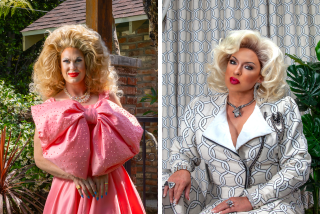Scratching that DJ itch
- Share via
In an anonymous strip of commerce in West L.A., beside a small bakery and a pet hospital, is a tribute to a staple of hip-hop and dance culture — the turntable. Up to 20 sets of hands turn wax-coated records into art inside the industrial, graffiti-painted walls of the Scratch DJ Academy.
In a world where “Jersey Shore” cast member Pauly D “spins” for a Britney Spears tour and takes home a seven-figure paycheck, and Conor Cruise, the 17-year-old son of Tom Cruise, books gigs on the Hollywood and international club circuits as C-Squared, the programmable iPod has made it so just about anyone can pose as a spin master.
But Scratch Academy, which will be celebrating its 10th anniversary in October, aims to take the experience back. Way back.
With a strong emphasis on the origins of the craft, turntables and vinyl, and a non-competitive, mentor-heavy learning environment, Scratch seems positioned as a purist institution with an acceptance of the future.
Born in 2002 in Manhattan’s East Village, with legendary Run-DMC member Jason “Jam Master Jay” Mizell as co-founder, Scratch counts more than 100,000 graduates from its flagship and additional locations in Miami and Los Angeles.
It boasts a marquee-caliber faculty and celeb fans in Samantha and Marc Ronson, Jazzy Jeff, DJ Irie and Snoop Lion. The school has spawned products including a coffee-table book and branded music-mixing software, and is even integrated into the 2010 video game title “DJ Hero 2.”
But before big business: basics.
“You go out nowadays and technology has made DJing so accessible for anyone,” said TJ Mizell, son of the late Jam Master Jay and a Scratch instructor.
“I love when people come in and the know absolutely nothing about vinyl, taking those people and turning them into DJs — they’re done in 18 weeks and they’re incredible,” Mizell said of the certification process, which takes four core classes and two electives.
“We embrace technology, but there’s laziness to a point. I love to bring a production standpoint to [DJ sets], it brings them to a live-performance level,” said Mizell.
Students seek a similar payoff, one that transcends the contemporary mainstream hit (which these days are rife with producer credits or guest appearances from massive DJ acts like Calvin Harris).
“I enjoy going out, gay clubs in West Hollywood, straight clubs in Hollywood and Silver Lake, but Top 40 [is] a little too easy,” said Bobby Boas, fresh off completing his second course in his trek to certification at Scratch’s L.A. branch.
Most of his library is digital, which is spun under the alias Boy Bob, but Boas maintains that manipulating vinyl records and keeping his own sense of timing for mixing and song transitions is rewarding.
“There’s so much going on in those headphones,” Boas said.
But using a platform well doesn’t necessarily make the best DJ, or the most popular.
“Having a DJ who can read the vibe of a room, adjust and get the crowd engaged is equally important as how skilled they are from a technical standpoint,” said Jason Scoppa, creative director of SBE’s Sayers Club.
“The problem is, anyone can be an iPod DJ, because everyone wants their taste validated. That’s why you see celebrities … why you see setups at your local restaurant, gym and clothing store. They’re not necessarily good, just in demand.”
There’s that saturation again. How does a music venue establish hierarchy?
“Nobody really cares about quality anymore. It’s about how many people you can bring out,” Mizell said, “factors like how you look and how you’re dressed. Please — there are DJs that I know, from skills alone, [who] should be billionaires by now.”
The Scratch culture talks an unpretentious talk, even when it comes to kinds of gigs.
“Ideally, I hope to get interesting kinds of jobs that don’t limit me, but, hey, I’ll take a song request. I’ll play a wedding,” said Boas.
“I want to go back to the old way,” he concluded, “when DJs told a story.”
He’s not in the Cruise family, but that could be just as maverick.
More to Read
The biggest entertainment stories
Get our big stories about Hollywood, film, television, music, arts, culture and more right in your inbox as soon as they publish.
You may occasionally receive promotional content from the Los Angeles Times.










